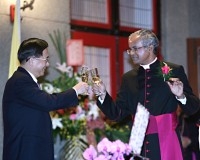News & activities
 News releases
News releases

I admire greatly the way in which Pope Benedict places emphasis on the importance of peace, as well as his concern for women, children, the poor in Africa, and those people who face great torment and suffering. I have always expressed our support of His Holiness' proposals at the earliest possible occasion. In addition to this, we have strengthened our commitment to promoting harmony among Taiwan's people and to caring for--and ensuring the inclusion of--new immigrants from Southeast Asia so as to make Taiwan a more peaceful and prosperous country.
In March this year, the Chinese Regional Bishops' Conference organized an international seminar entitled "The Catholic Church in Asia Cares for Migrants in Taiwan." Consequently, I had the pleasure of meeting His Eminence Cardinal Renato Raffaele Martino—president of both the Pontifical Council for Pastoral Care of Migrants and Itinerant People and the Pontifical Council for Justice and Peace, as he was invited to Taiwan to attend the conference. By speaking to Cardinal Martino, I was able to learn more about the Holy See's ideals and means of upholding human rights and justice, of caring for the disadvantaged, and of finding peaceful solutions to social problems. It is my hope that Taiwan will be able to continue such exchanges with the Holy See so that our mutual understanding and friendship can continue to be strengthened.
The Republic of China (Taiwan) is a democratic and peace-loving country. After receiving international aid for several years, we were able to develop a successful economy and improve people's lives. Now, Taiwan seeks to repay the international community by helping people in need throughout the world. We have dispatched technical, agricultural, and medical missions to our diplomatic allies in Africa, Latin America, and the South Pacific to help improve lives there. Such a spirit of sacrifice fits well with the Pope's visions of caring for the disadvantaged and building peace.
In this year's Message for the World Day of Peace, Pope Benedict said that, "The duty to respect the dignity of each human being…means in consequence that the person cannot be disposed of at will. Those with greater political, technical, or economic power may not use that power to violate the rights of others who are less fortunate." In the Universal Declaration promulgated in 1948, the United Nations clearly stated that its fundamental task would be the promotion of human rights. However, for many years, China has been relentless in its efforts to suppress Taiwan's space in the international community. That is why Taiwan is still barred from the gates of the UN. China's behavior has not only violated the principle of universality in the UN Charter but also deprived the 23 million Taiwan people of their collective human right to equal participation in the international community.
In his Message for the World Day of Peace, the Pope also expressed concerns about religious persecution in certain countries. Pope Benedict pointed out that the lack of respect for religious freedom as a fundamental human right inevitably leads to "a mentality and culture that is not conducive to peace." This is a realistic observation, through which the Pope warned people of the negative consequences of disregarding religious freedom. A report published by the US-based Freedom House last year on the level of freedom in different countries noted that religious freedom is accorded little respect in China, and that China's new Regulations on Religious Affairs, which took effect in March 2005, may lead to even more restriction of religious freedom. In contrast, the same report gave Taiwan full scores for the freedoms of religion and speech.
We mention this not to boast of our accomplishments or to take pride in comparing Taiwan and China, but to emphasize how important it is for China to pursue the path to democracy; because only a full and healthy democracy can protect and respect all fundamental human rights, including religious freedom. We believe that it is our people's commitment to deepening and consolidating our democracy that makes Taiwan one of the freest countries in the world. Through the long and arduous journey from authoritarianism to democracy, the people of Taiwan have experienced the pain of having no freedom under an authoritarian regime and the joy of freedom in a democracy. This is why Taiwan and the Holy See are able to forge an alliance based on common values, and why we are able to share a common belief in democracy, human rights, freedom, and peace.
We believe that, under the guidance and care of His Holiness Pope Benedict XVI, the international community will work harder to promote peace in the world. We also believe that the alliance between the Holy See and Taiwan--based on a commitment to peace and benevolence--will be able to deepen and mature further still. Distinguished guests, ladies and gentlemen: On this auspicious occasion of His Holiness Pope Benedict XVI's second anniversary in office, please join me in wishing His Holiness health and happiness, and in passing our best wishes on to the Holy See. Thank you!


